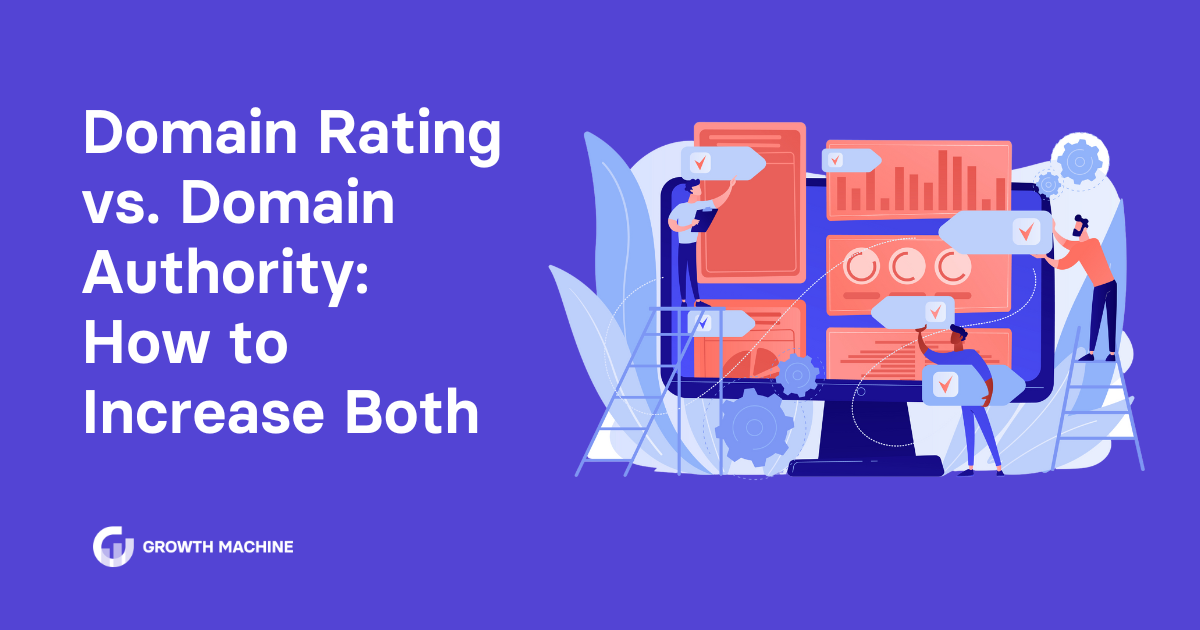Domain Rating vs. Domain Authority: How to Increase Both
Your domain rating or DR score is the main place to look if you’re trying to gauge your entire website’s authority and reach on the internet. It helps you see how your site as a whole performs on search engine result pages (or SERPs), predict how it’ll do in the future, and strategize for how to increase it in the future.
Where individual page authority scores show you how much of an SEO impact a single page has on search algorithms, your domain rating takes a much more wide angle view. A high domain authority score indicates your page is ranking well holistically. It’s a sign your efforts to optimize your web presence are paying off.
The higher this score goes, the more traction your site will get inside the gears of search algorithms. So if you’re hoping to show up as high on customers’ Google searches as possible, we’ll show you how to boost your domain rating.
What’s the Difference Between Domain Authority and Domain Rating?
Your website’s domain rating and domain authority are, for all intents and purposes, the same thing. Their main point of divergence is who created the calculations behind the scores, even if they draw on the same information and provide very similar insights.
Domain authority is the score Moz uses to track how your website’s total domain performs when it comes to SEO and organic traffic, whereas domain rating is the scoring system developed by Ahrefs.
Moz’s Domain Authority Checker and Ahrefs’ Website Authority or Domain Rating checker will provide you the same insights into how your site is performing, although they may use slightly different calculations and metrics to do so.
What Factors Weigh Into Domain Rating?
Your domain rating will increase or decrease because of factors both inside and outside of your control. This may sound a tad disheartening at first. After all, who wants to leave something like this to chance? But the good news is that there are far more components in your control than there are out of it.
For example, you won’t have the built-in advantage older websites have of building up credibility over time, but you will have access to the latest and greatest SEO technology to make up for this gap. As always, the main tools necessary for SEO — like link building, content optimization, and so on — are right at your fingertips too.
These are just a few of the key domain rating metrics to take into consideration:
- Domain age: Your website’s domain age will have at least some impact on your domain rating overall. This is because older sites have had more of a chance to get noticed by other sites. Time online is a huge component in making sure backlinks come rolling in for you. Still, there’s plenty you can do to increase the linking domains for your new website too.
- External link count: Your website’s external link count, or the number of inbound links pointing back to your website from other sites, will help boost your domain rating score. Domain authority checker tools — like you can find on Moz or Semrush — can help you measure the total number of backlinks like this out there.
- Internal link count: While you can only encourage backlinks up to a certain point, you have total control over linking well within your own domain. Generally, the more high-quality links you have pointing to other relevant articles and posts within your website’s archive, the higher your domain rating will be.
- Link quality: The quality of the links pointing to your website is another important factor to consider. A link profile including many high-quality backlinks from authoritative websites is infinitely more valuable than one that includes low-quality links from spammy websites. Getting your numbers as high as they can go with backlinks is definitely important, but quality should be your priority over quantity at all times.
- Page authority: The overall strength of every single one of your web pages also plays a role in your domain rating as a whole. The whole can be equal to or greater than the sum of its parts as long as you always do your best to create the sort of engaging and optimized content your customers deserve.
- Social media sharing: Social media shares can also play a role in your domain rating. Websites that are frequently shared on social media tend to have a higher domain rating than websites that are not.
How Do You Calculate Domain Rating?
Ahrefs, Moz, and Semrush are just some of the companies offering domain rating and authority checkers. All of these can give you an estimate of your website’s total domain strength based on your backlink profile and other factors.
These tools calculate domain rating on a logarithmic scale from 0 to 100, which is a fancy way of saying it gets harder to increase your score the higher it goes. For instance, going from 20 to 30 is a lot easier than boosting it from 70 to 80.
If you want to stick with the original domain rating checker, look at your Ahrefs rank first. Just remember you’ll get largely the same information no matter which domain rating checker you use.
You may need to use additional tools to check other aspects of your website like individual page authority. The more you know about your website — as a whole and piece by piece — the better chance you’ll have of making a difference when it comes to all the Google ranking factors.
3 Ways to Increase Your Domain Rating
Increasing your domain rating requires a multifaceted strategy. For one thing, any attempt to improve your domain’s overall ranking online should pair with a more wide-angle page authority and SEO strategy.
With these three tips, you’ll boost your domain rating, increase your website’s total authority, and expand your reach and impact on the internet.
1. Craft an Effective Link Building Strategy
Focus on acquiring high-quality do-follow links from authoritative websites in your niche. Internal linking is also important, as it helps to distribute link equity across your site. All of these will also help you do better within the constraints set by Google’s PageRank algorithm.
Analyze your website’s backlink profile and domain ranking, and identify external websites that have high domain authority. Consider guest posting on these websites to acquire high-quality backlinks. Be cautious of low-quality backlinks, as they can actually harm your domain rating. Instead, focus on building a network of high-quality backlinks.
Still, don’t let this convince you to settle for a lower number of links. You want the highest number of high-quality backlinks possible. Just opt for quality over quantity if you have to.
2. Optimize Your Content
Creating high-quality, authoritative, optimized content is a key factor in improving your domain rating. Put your content marketing cap on, and use SEO tools to supercharge whatever strategy you decide on. Produce in-depth, informative, and relevant content in alignment with key search engine ranking factors.
Organic traffic will naturally flow to your website when you provide high-quality content to meet the needs of your target audience. This’ll make other sites notice and link to you as well, and your domain rating score will thank you for it.
3. Emphasize Shareability
Social media can prove a very useful ally in increasing your domain rating. By creating shareable content that will be popular on social media platforms, you boost the chances of authoritative sites linking to it. This’ll get you the high DA score you deserve.
Share your content across your social media channels, and encourage your followers to do the same. Provide intuitive sharing buttons on each individual page, and your readers will know how to do the rest! Repeat the process throughout your entire domain to make sure each page gets its day in the sun.
High engagement equates to high authority, and both together will add up to a high website ranking.
Maximize Your Domain Rating With a Powerful SEO Strategy
Your domain rating is proof all your hard work on individual pages can add up to success in a major way. Combined with all your other SEO tools, it can show search algorithms what you’ve known all along: You have something important to say — and people think it’s worth hearing.
As more people link back to pages on your site, you can return the favor to them too. When everybody pays it forward online, a rising tide lifts all boats. You help increase their domain rating, they help you increase yours, and your customer base and visitor count will go up too. Like a snowball rolling down a hill, it’ll just grow and grow and grow.
Ready to increase your domain rating and boost your site’s ranking on every SERP in sight? Contact us to set up a call with one of our SEO experts today!







![How to Build a Digital Content Strategy: Step-by-Step Guide [2023]](https://www.growthmachine.com/wp-content/uploads/2024/06/How-to-Build-a-Digital-Content-Strategy-Step-by-Step-Guide-2023-768x403.png)